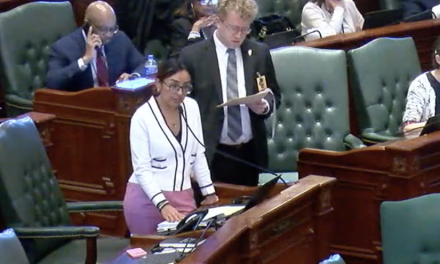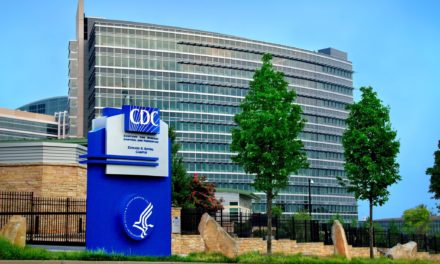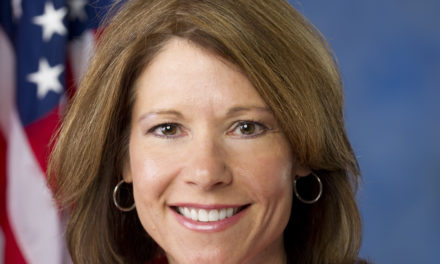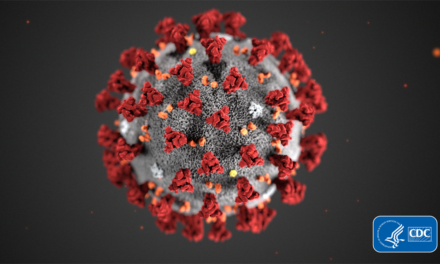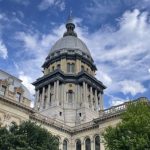
Entheo IL’s Geoff Bathje on push to regulate psychedelics in Illinois
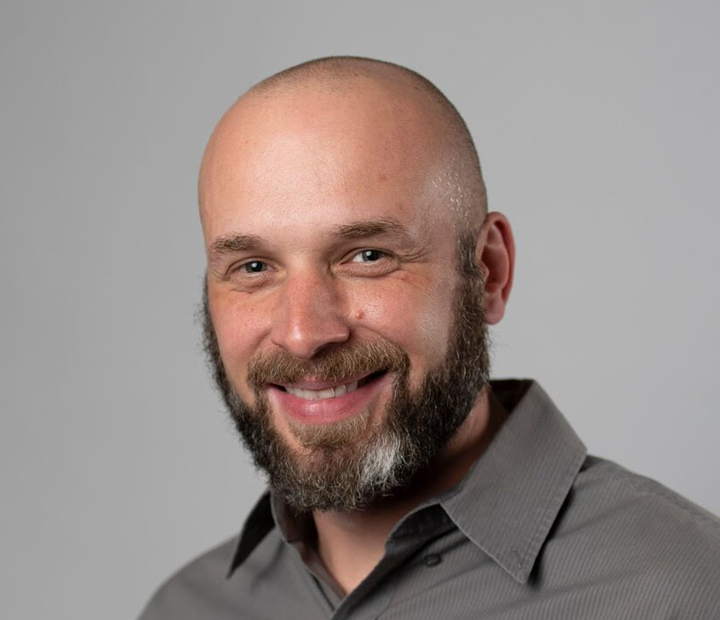
Among the hundreds of proposals introduced in the early weeks of the spring legislative session is a plan to create a new program in Illinois that would give patients access to psychedelic therapy.
The introduction of the legislation by Rep. La Shawn Ford, D-Chicago, coincided with the launch of Entheo IL, a statewide coalition to advocate for the use of entheogens, such as psilocybin, to treat those suffering from mental health challenges.
“I think (psychedelics) have tremendous promise, not just for whatever the specified mental health applications that have been found, but they have a long history that predates psychotherapy,” Geoff Bathje, vice president of the group’s board of directors, recently told Health News Illinois.
Under Ford’s proposal, the state would establish a regulated psychedelic therapy program allowing adults to seek supervised entheogenic therapy from a trained facilitator, with the natural medicines produced and tested at licensed service centers. It would also remove criminal penalties for the personal use of psilocybin.
Bathje, who also operates the Chicago-based Sana Healing Collective, which provides ketamine-assisted therapy and holistic mental health services, also spoke about his research on the use of psychedelics to provide care to patients, lessons learned from other states looking at psilocybin treatments and overcoming decades of baggage around psychedelics.
Edited excerpts below:
HNI: How did Entheo IL come about?
GB: There’s been a couple of us who’ve been organizing around psychedelics over the past years. So, among a few of the leaders of the organization are Jean Lacy… and Vilmarie (Fraguada Narloch) and myself. Jean has been running the Illinois Psychedelic Society, and then Vilmarie and I and another colleague have been running a group called Psychedelic Safety, Support and Integration that’s focused on providing accurate education around psychedelics, harm reduction and covering different topics and then having a place where people could build community and support and process those experiences that they were having. We started doing that around 2017. It was kind of organic. Vilmarie and I and Jean had all been involved in policy reform efforts before, so we got included when Rep. Ford started looking at Oregon’s psilocybin initiative, and that was the basis of what we started doing. And we talked to people in all the other states that have done that as well. Then we connected with Julia (Ellis, director of government relations at Entheo IL) … whose sister has a personal healing experience with medicine, and she has produced policy, so there was really a pretty organic process of interest in the work that pulled together the coalition.
HNI: What has been your experience so far in the field?
GB: I’ve been tracking it pretty closely for at least the past seven to eight years. So what we were seeing then was some enthusiasm among the public based on a lot of the research. Psychedelics were back on the radar after a couple of decades of not being so much. So we would see people, because of this prohibition and because we can’t talk openly about substances, not knowing how to use them safely, not having accurate knowledge about their effects or how to use them. And so we built an organization as a safety net, and then Vilmarie and I both went and got into the first certificate program offered by a university, out of the California Institute of Integral Studies, where they offered a psychedelic therapy certificate program. So we were some of the first groups to go through that program. It connected us with a lot of other people who were doing the research and trying to advance the field. That was in 2017 when I went through. So I started doing research projects around psychedelics, specifically related to therapeutic goals, but also beyond just the psychotherapy goals. Then we started our organization to go do some safety and community building. I also started practicing ketamine-assisted therapy around that same time. So I’ve been doing that for over six years. I sat with clients at some of the ketamine clinics and provided therapy during and after that experience. And that eventually led to us opening up a nonprofit organization (Sana Healing Collective) to ensure more accessible, equitable access to this new treatment.
HNI: What do you see as the promise of these compounds in treating mental health challenges?
GB: I think they have tremendous promise, not just for whatever the specified mental health applications that have been found, but they have a long history that predates psychotherapy. There are cultures that have used different psychedelics for hundreds or thousands of years, and you see them have a pretty central role in the culture over time and in some cultural groups. So they have spiritual significance, they have relational, community significance. The discovery of the mental health benefit is a little bit more of a modern discovery, but these substances seem to have much more social and cultural value than just what you would get from looking through a medical lens.
HNI: How do you address some of the historical baggage that surrounds psychedelics?
GB: It’s important to note that some of that historical baggage is not about research, it was about politics and opportunism. Michelle Alexander in her book, “The New Jim Crow,” makes a really compelling case that the sole purpose of the drug war had nothing to do with the harms of drugs. It was all about creating ways to disrupt the civil rights movement and target anti-war activists and people of color. So I think she made a really clear case for that, that the stated outcome of the war on drugs might have been control of drugs, but the actual outcome was oppressing of activist movements and civil rights movements. So I think psychedelics got swept up in that. There were a lot of false narratives created about their dangers, about them creating permanent insanity and getting into your spinal fluid and staying there for the rest of your life, all things that really had no basis in research. And so in the current wave, what we’re finding is — and there are different classes of drugs that are called psychedelics, but especially the classic psychedelics like psilocybin — they have a really good safety profile. They can be challenging psychologically — but that’s the intent of the bill is that when substances are criminalized, it’s just kind of the Wild West. And so people are misinformed, and the intention of the bill is to create better public education around psychedelics, facilitated services for people that are using them for some outcome that they’re seeking, whether mental health or otherwise. It has some parallels to what the (Food and Drug Administration) is doing, which will be a lot more narrow and focused, maybe on one diagnosis per psychedelic, at least initially.
HNI: What are you hearing from colleagues in other states that are looking at this, or in the case of Oregon, have passed similar proposals?
GB: It’s kind of different things in different places. If we look at Oregon, theirs just went live, though I don’t think they have all the infrastructure in place yet, so I don’t know that it’s actually in practice yet. So out of Oregon, it’s valuable just to hear there are challenges with things like setting up the advisory board that would be responsible for creating a lot of the infrastructure and the rules and regulations and all that around it. So we learned about some of the challenges that they had faced and got some ideas from them, including how to make it more equitable. When we talk about Colorado, we heard about the pushback they got from having out-of-staters funding them and the importance of really keeping it grassroots and locally informed, because it needs to play out probably a little bit different in every state.
And I think some of the other states gave us a different angle to look at it. California and Washington have their own approaches. It would be hard for me to point to specific things we got from them. But I think, just overall, looking at four or five different states gave us the landscape of possibilities of what it could look like and a lot of ideas in different places that we thought made sense for Illinois.
HNI: How do you see Illinois compared to other states when it comes to accepting psychedelics as a form of care?
GB: The Midwest is an interesting place where we have sometimes a caution around making dramatic reforms. But we also have a real history of being at the center of ideas that have been influential in the country. Illinois is the birthplace of social work, of community organizing and these different movements to help people. So I do think it makes sense for the Midwest, and Illinois in particular, to be a place to weigh in on what these bills should look like, not just on the East and West Coast. Not that you don’t see things implemented first there, but I do think the Midwest is kind of a crossroads for the country and can be a good indicator of readiness and where things are at nationwide.
HNI: What’s been your takeaway from the medical community on the psychedelic front?
GB: It’s mixed. With the volume of research that comes out, it’s difficult for every medical provider to be aware of every area of research. So I totally understand that, especially for the emerging areas of research that they can’t really use in practice yet. They might not be very aware of this research yet. And so, I find that if I can talk from the perspective of clients and of people who have looked at the research themselves, they are much more likely to see that this is going to have a huge impact on the field and it’s going to change the future of fields like psychiatry and psychotherapy in becoming a real common practice. It’s very different from the existing practices. So I have seen sometimes a caution about it if people haven’t looked at the research and then usually an enthusiasm about it when people do look at the research. But it’s important to point out too that this bill is really broader than the therapy uses of psilocybin. And also, it’s important for equity reasons, because the treatments are probably going to be pretty expensive and not very accessible for a long time. I think usually it’s about 20 years between a new treatment being approved before it’s universally available.
HNI: What’s next for Entheo IL?
GB: I think that the next step will be for us to continue to include other interested groups in the organization and the coalition to advocate for the bill, to connect with anybody else if there are other legislative ideas around psychedelics. We’d love to connect with people who are working on those ideas. And then talk to different legislators about the bill, because psychedelics really do have a lot of misconceptions that can come with them. And so just to be proactive and look at this as an opportunity to answer any questions and help better understand what the science and the research are saying about psychedelics. Even if this bill weren’t to pass, I think it’s important that we have this dialogue around psychedelics because, at the minimum, they’ll be coming through the FDA and the use of them is increasing broadly just because people see the research. They are aware that there are benefits in many different aspects of life from psychedelics. So it’s just really important that we have a cultural conversation around psychedelics.


